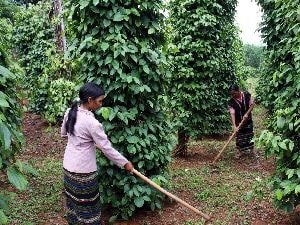Using biological products in pepper cultivation
After many years of research, Tay Nguyen University has found a way to use biological products in pepper cultivation.

Stieng people in Bu Gia Map commune, Phuoc Long district take care of pepper gardens. (Photo: Trong Duc/VNA)
Accordingly, the school has built reasonable production models to ensure sustainable pepper cultivation, bring high economic efficiency, be environmentally friendly, and bring new awareness to people in pepper cultivation.
Scientists have used biological preparations chitin, chitosan and chitosan oligomer for pepper plants in the basic construction period.
Biological products are extracted from shells of shrimp, crabs, insects, and fungal cell walls. These ingredients are non-toxic, biodegradable, and environmentally safe.
Chitosan and chitosan oligomer components have growth-stimulating activity in plants, increase the number of beneficial microorganisms, limit harmful fungi in the soil and enhance the plant's resistance system to crops.
Applied in production, the preparations were watered on pepper plants three times, each time 15 days apart. After three months, the number of molds and actinomycetes in the soil increased rapidly.
Most of these actinomycetes and molds have the ability to synthesize enzymes that dissolve the cell walls of pathogenic fungi and some insects, helping pepper plants increase their resistance to soil-borne fungi.
During cultivation, applying chitosan and chitosan oligomer preparations significantly reduced the number of Fusarium fungi causing disease in pepper plants.
In addition to the mechanism of indirectly increasing the number of molds and actinomycetes, chitosan and chitosan oligomer preparations also have direct anti-Fusarium activity. Fusarium fungi were completely inhibited when cultured on media supplemented with chitosan and chitosan oligomer at concentrations of 0.1-0.15%.
The above biological products also reduce the number of nematodes in pepper roots up to eight times compared to gardens that do not use the products.
On the other hand, when spraying chitosan oligomer at a concentration of 200 mg/l on leaves, the amount of chlorophyll in pepper leaves increased by nearly 50%. The plant was stimulated to grow the main stem and branches to grow faster.
Production practice has shown that biological preparations chitin, chitosan and chitosan oligomer when watered or applied to the soil have been clearly effective in improving the microbial flora in pepper growing soil, contributing to significantly reducing the number of pathogenic fungi on pepper plants.
Adopting the research and experimental results of Tay Nguyen University, the Department of Agriculture and Rural Development of Dak Nong is applying the use of biological products to pepper cultivation in the basic construction period of many farming households and has achieved positive results. In particular, it is widely applied in localities with a lot of pepper cultivation such as Dak R'lap district, Cu Jut and Gia Nghia town.
Pepper is an industrial plant with high economic value, but currently the cultivation of this plant by households is facing many difficulties. The main cause is the widespread destruction of yellow leaf disease, quick yellow leaf death, slow yellow leaf death caused by viruses.
Currently, chemical control measures are ineffective and pollute the environment. The initial success of using biological products in pepper cultivation has brought great prospects for sustainable production development. In the coming time, scientists will continue to research biological products for pepper cultivation during the business period, aiming to improve production efficiency for farmers./.
According to (TTXVN) - LY






